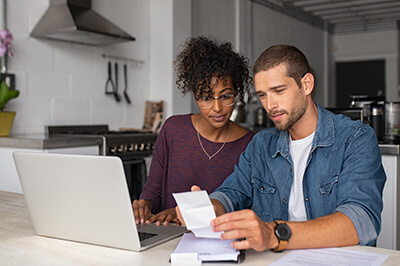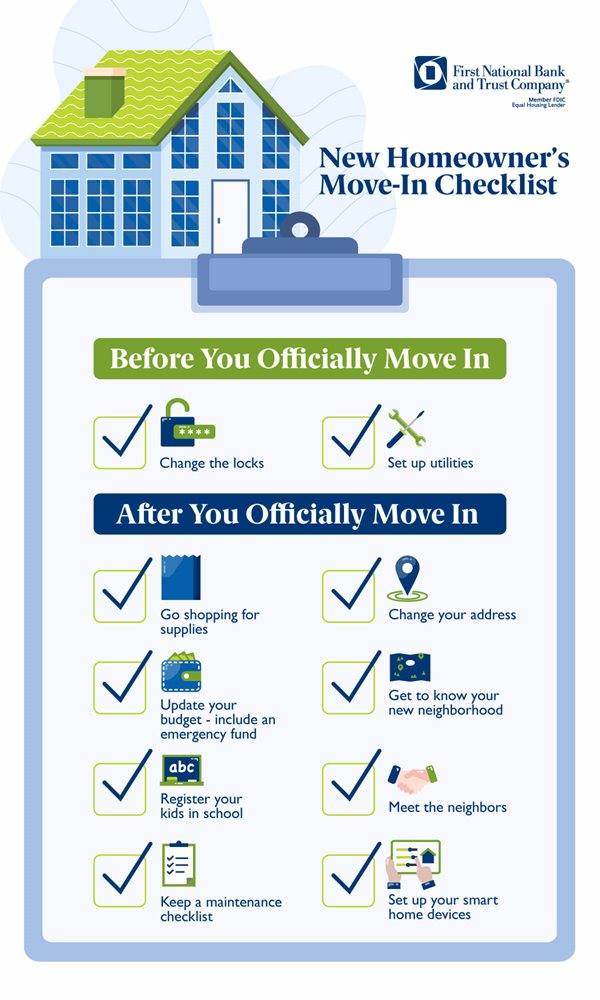The New Homeowner’s Move-In Checklist
In honor of National Homeownership Month, we compiled this new homeowner's checklist to help new homeowners prepare for this exciting new chapter in life.

You’ve finally closed on your new property, perhaps as a first-time homebuyer! It’s an exciting time, but there’s also so much to think about before settling in and calling your new house a home.
June is national homeownership month, so the First National Bank and Trust team wants to recognize this by helping you prepare for this exciting new chapter in your life. Our new homeowner checklist will guide you through the essential steps to prepare your new home as you settle in and make it your own.
Change the locks
On your first day in your home, consider changing the locks on every external door. As a safety precaution, it’s always best to switch these out as soon as possible to ensure that no one can enter your property without your knowledge or approval.
While the previous homeowner likely left you a stack of keys on the kitchen counter or handed them over at closing, you never know who might have a copy that they forgot to ask for back.
Set up utilities
Before closing on your new home, it is critical to contact the utility companies that the previous owners have identified as servicing the property. If you’re moving within the same area, these might be the same providers that you currently use for your rental or previous home.
If you haven’t contacted utility providers or other services like cable and internet, you’ll want to take care of this as soon as possible. You should also find out who the local trash and recycling providers are and the schedule for trash collection at your new home. If you can’t find this information online, this can be a good opportunity to introduce yourself to the neighbors and discover more details about your new neighborhood.
Move in
Moving day will likely be a busy time for you as you experience the first day in your new home. You will have a mix of emotions while also coordinating the transfer of all your belongings into the new property.
Before bringing in furniture and personal items, clean every room as thoroughly as possible. After all, once the couch and bed are set up, you probably won’t be cleaning under those for a while!
Take your time and enjoy the process of settling into your new home. Prioritize the most important items and work down to the least important ones. Remember, taking things one room at a time is perfectly okay. This will make your move-in process more manageable and stress-free.
To help prepare for move-in day, pack a bag or box with some first-day essentials like toilet paper, coffee, and any personal care items you might need. That way, you can avoid the stress of going through multiple boxes to find much-needed items or making a midnight run to the grocery store.
Go shopping
Before leaving the house for the first time, make a list of anything you need to get that you know you don’t have in boxes or you might need more of. Check the home for smoke and carbon monoxide detectors and any fire extinguishers, along with assessing your first aid kit supplies. You should also check for any toiletries, linens, or furniture you need immediately.
The next priority should be stocking your fridge and pantry. You likely have items you’ve brought from your previous home, but you may need to restock some of the fridge or freezer items you used before your move or gave away to keep them from spoiling.
Change your address
To prepare for moving into your new home, creating a checklist of all the places you’ll need to update your address once you’ve officially taken ownership is helpful.
The
Post Office has a helpful online form that redirects your mail from your previous address and provides information about other official places you’ll need to update, like the IRS, immigration, voter registration, and your vehicle registration and license.
You’ll also need to update any banking and financial institutions, along with any other companies that send you mail frequently. Your employer will also need to update their records with your new address and don’t forget to change any services like meal deliveries that you receive, grocery drop-offs, and other subscriptions or online shopping sites that you buy from frequently.
Update your budget
Having
a budget before purchasing a home is a wise decision to ensure you can afford your new lifestyle. However, taking the time to finalize and
update your budget now to include your new
home loan payment, any HOA fees, and potential increases in utility bills due to a larger living space can truly empower you to make informed financial decisions and confidently move forward with your dream of owning a home.
As a new homeowner, you should also be budgeting for any maintenance on your property or unexpected home expenses. Over the next few months, track your spending carefully, as you may need to adjust your budget once you have a better idea of what everything costs in your new home.

Get to know the area
If you’re moving to a new area, take some time getting to know your neighborhood and the surrounding towns or cities. Become familiar with places you’re most likely to visit frequently, like:
- Grocery stores
- Local schools
- Post office
- Doctors’ offices, hospitals, dentists, and other medical services
- Library
- Hardware and home improvement stores - you’ll likely be needing these over the next few months!
Knowing where to find the businesses you might need, such as retail shops, restaurants, or cafes, is always helpful. Also, don't hesitate to ask for recommendations on maintenance and landscaping services, and take some time to get familiar with local transportation options in case you need them.
Register your kids in school
If you have children, be sure to register them for their new schools as soon as possible. This will help avoid any delays in their start date once you’re moved in.
Meet the neighbors
Get to know your closest neighbors as soon as you can once you move in. If you have a homeowners association, find out who’s on the board and where they live in your community, and try to attend some of the events they have scheduled to meet new people living nearby. You can also take this time to ask any questions about the HOA that you might have.
If you’re new to the area, consider sites like Nextdoor or Facebook groups to discover what’s going on in the local community and meet some of the neighbors in your new town.
Start an emergency fund
Having some savings set aside for unexpected expenses is always beneficial, but it’s even more important when you’re a homeowner. You never know when something might break or an emergency might come up. It’s always a good idea to allocate extra funds to your monthly
budget for unforeseen emergencies.
Keep a maintenance checklist
As a homeowner, it is important to regularly maintain your house. Start by reviewing the list provided by home inspectors during the buying process. This list highlights items that need to be fixed immediately and should be prioritized on your maintenance checklist.
Aside from these one-off fixes, one of the most important pieces to consider when thinking about what to do after you move into your new home is setting aside some time to create a list of seasonal maintenance you’ll need to do. This could be anything from servicing your AC and heating systems annually, to spring cleanup and
winterizing your home ahead of the colder months.
Set up your smart home devices
If you’re planning to use any smart devices in your home like a speaker, thermostat, doorbell, or cameras, you’ll want to spend some time connecting these to your Wi-Fi and putting them in their new places around your home.Smart devices are one way to
make your home more energy-efficient.
Have a housewarming party
Moving into a new home, especially as a first-time buyer, is a moment that you’ll want to celebrate with the people closest to you. A housewarming party is a perfect opportunity to share this significant occasion with loved ones and receive thoughtful gifts that can help ease the financial strain of the move. After settling in, invite your friends and family to enjoy their company and the warmth of your new home.
Celebrate life’s biggest milestones with FNBT
At First National Bank and Trust, we aim to support you through every stage of your life. From opening your very first
checking account and
funding your way through college, to providing you with home and
business loans that can take your financial goals from dreams to reality, the
team at FNBT is here to help with your money matters.